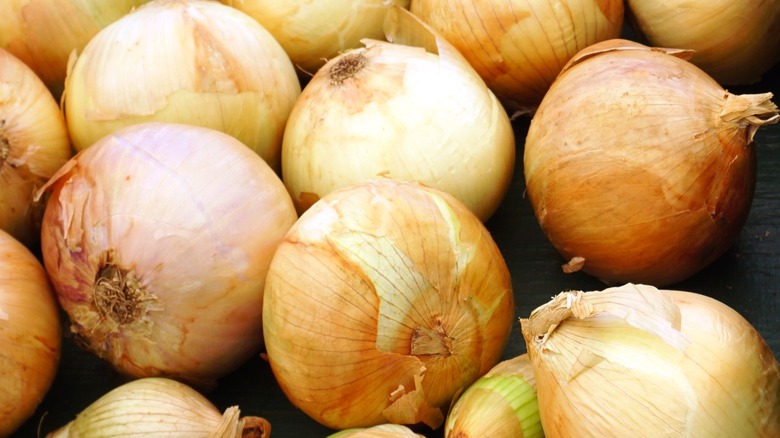The Reason Maui Onions Are So Sweet
Maui onions are one of the few alliums that are so pleasantly sweet that they can be eaten as if they were an apple — although we prefer using fresh slices to top BLTs, burgers, and poke bowls. That said, while Gills Onions explains that any onion softens and becomes more honeyed as it cooks, Mauis have a candy-like quality even before they're kissed with heat. The question is, why do the onions have a perpetually caramelized flavor?
A building block in any recipe, onions can contribute aroma and add texture, but most impressively, they add a world of flavor. Abundant in umami-rich glutamates, Salt Sear Savor explains that cooking with the ingredient can make a dish more well-balanced and, thus, tastier. Plus, Well + Good even reports that the inclusion of alliums (such as onions) in a dish allows our bodies to better absorb zinc and iron in other foods. However, not all onions are the same.
With nutty nuances, the crunchy and vibrant Maui onion is relatively small with a flat, but occasionally, elongated shape. Its iconic yellow and papery skin covers layers of ivory flesh inside, each bursting with succulent and juicy flavor. Milder than both yellow and red onions alike, the allium is prized for its minimal pungency, something that Maui Hacks attributes to the onion's origin.
Thank the unique Hawaiian terroir
Terroir once used to be a term reserved for wine, but now the concept extends to coffee, chocolate, and even produce. Essentially, Science News shares that terroir describes how a specific environment can impact the taste of a commodity through both climatic and microbial factors. Naturally, this school of thought can also be applied to onions.
Exclusively grown on the slopes surrounding the dormant Mount Haleakalā, Maui Now reports that many producers claim that Maui onions owe their sweetness to the rich and red volcanic soils coupled with the favorably warm island climate. According to Nature's Produce, it's this unique terroir that produces an onion that's low in sulfur, an element that's found in the compounds that give onions their typical pungent taste and tear-inspiring aroma.
Given that authentic Maui onions can only be grown on the Hawaiian island of the same name, some viable substitutes include varieties like the Vidalia, Texas 1015, and Walla Walla. However, if you're lucky enough to find Mauis at the market, Foodland notes that they can be kept up to two months in a dry and cool place like the pantry, or about four days in the fridge once sliced — but we doubt that the onions will be sitting around for long anyway!

